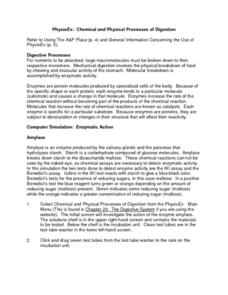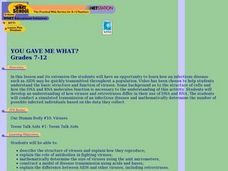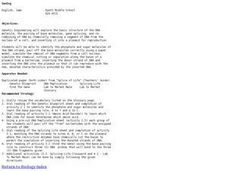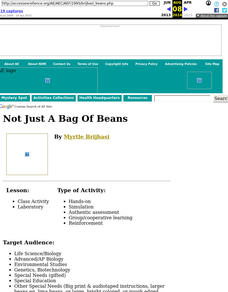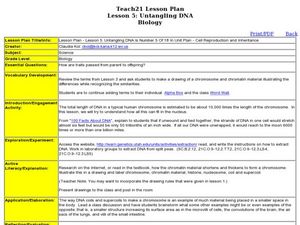Curated OER
What Does My Bacteria Look Like?
Students identify Gram positive and Gram negative bacteria using staining techniques. Students research importance of identification of bacterial types in diagnosing bacterial diseases.
Curated OER
An Introduction to Dichotomous Keys
Young scholars pretend to be shark biologists employed by the National Oceanic and Atmospheric Administration (NOAA) who have been flown into the coastal city of Sao Luis in Brazil because locals have noticed an unidentified shark at...
Curated OER
Alcoholic Fermentation in Yeast
Biology learners investigate the effect of sucrose concentration on yeast alcoholic fermentation. During the lesson plan,they compare and contrast the processes of cellular respiration and alcoholic fermentation. They design an...
Curated OER
PhysioEx: Chemical and Physical Processes of Digestion
In this anatomy worksheet, students complete 22 review questions in the format of short answer, table completion, and fill in the blank after finishing an online virtual experiment about the chemical and physical processes of digestion.
Curated OER
Pete And Repeat
Students draw a picture of a person from popular culture, then "clone" it using printing techniques in this Art lesson that tackles the questions surrounding cloning, DNA, and current scientific techniques. An emphasis is placed on the...
Curated OER
Launching a Defense; Understanding the Human Immune System
Students research online to answer and develop questions about immune system, create Powerpoint presentation to share information with classmates, and assimilate information into pictorial and/or graphical description of immune system.
Curated OER
Launching a Defense; Understanding the Human Immune System
Students research online to answer and develop questions about immune system, create Powerpoint presentation to share information with classmates, and assimilate information into pictorial and/or graphical description of immune system.
Curated OER
Embryology as Evidence of Evolution
Students observe the two major developmental pathways (protostome and deuterostome). They analyze data regarding differences in nucleotide sequences and construct a phylogenetic tree. They observe the similar evolutionary history shared...
Curated OER
You Gave Me What?
Students see how an infectious disease such as AIDS may be quickly transmitted throughout a population. They conduct a simulated transmission of an infectious disease and mathematically determine the number of possible infected individuals.
Curated OER
What's Inside
Students become more familiar with life science in the context of the scientific method which helps them to become familiar with the various kinds of life science diagrams they may see on a GED science test.
Curated OER
Nucleic Acids and Protein Synthesis
Tenth graders complete a vocabulary assignment based on terms in the unit. They complete appropriate worksheets as each section of the unit is completed. They participate in classroom discussions. They construct a model of a DNA molecule.
Curated OER
GenEng
Students investigate the process of genetic engineering. In this genetic engineering lesson plan, students use paper models of DNA and plasmid bacterium to investigate the process of replicating DNA, splicing genes from DNA, and...
Curated OER
What Makes Bones Strong?
Students explore the function of bone, muscle, and skin. Pasta and rubber bands are used to model how minerals and collagen contribute to bone strength. The effects of the reduction of these substances are explored in chicken bones.
Curated OER
18th Century Microscope
Students examine a microscope from the 18th century. In this microscope lesson, students investigate how it works, what it was used for and how the tool has evolved through the years. Students also build knowledge on how compound...
Curated OER
Light Microscopes
Seventh graders study the parts of a light microscope, and its proper use. They identify each part and explain why it is important to know how to use this tool. They practice observing newsprint on a wet mount slide.
Curated OER
Not Just a Bag of Beans
Students determine the types of natural selection and variation that exists in a population, using beans.
Curated OER
Panther Exam: Writing a Play
Students demonstrate their knowledge of panthers by writing a play on the subject. In this animal life lesson, students view a slide-show on school computers of a veterinary exam of a panther. Students utilize this...
Curated OER
The Effects of Temperature Variations on the Heartbeat Rate of Daphnia
Students use DigiScope technology to investigate Daphinia, popularly known as water fleas. They design, conduct, and report on an experiment to determine the effects of varying water temperatures on the heartbeat rate of Daphnia.
Curated OER
Food For Thought
Learners examine their school population about their health and exercise patterns. They brainstorm a list of factors that influence people to eat the way they do.
Curated OER
Water Cycle
Third graders define and discuss evaporation, precipitation, condensation, and collection, color web pages to illustrate Water Cycle book, listen to stories about Water Cycle, play trivia game to demonstrate knowledge of what they...
Curated OER
Lesson 5: Untangling DNA
Students extract DNA from split peas. In this biology lesson, students research how chromatin form into chromosomes. They draw the stages and present their work in class.
Curated OER
The Arizona Hedgehog Cactus: Endangered Species or not?: Biology, Plants
For this lesson students will study the: "Classification of Echinocereus triglochidiatus and Geographical Ranges of its Varieties." Students read background material and scientific literature to analyze the cactus populations and then...
Curated OER
Science Lesson: Chocolate Flavored Cherries
Students are able to identify start and stop sequences in DNA. They are able to model using restriction enzyme and ligase to remove sections of DNA and reattach them. Students are introduced to the process of recombinat DNA through the...
Curated OER
The Role of Enzymes
Learners explore the role of enzymes in chemical reactions. In this enzymes lesson plan, students use hydrogen peroxide and manganese dioxide to observe a chemical reaction. Learners observe the rates of reactions of chalk, hamburger,...



